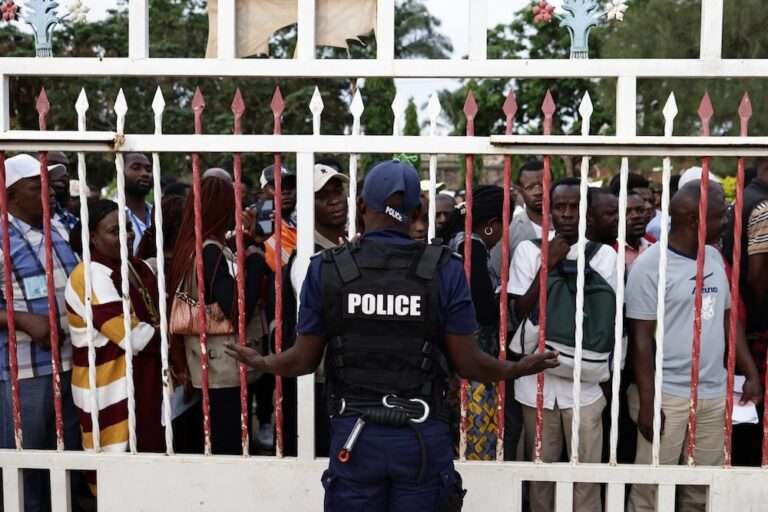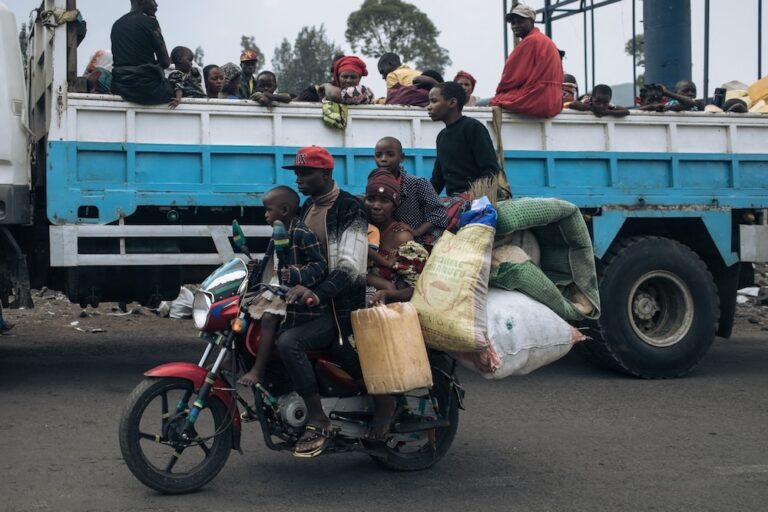(JED/IFEX) – The following is a 20 July 2004 JED press release: JED condemns security services and police interference in media’s work On 19 July 2004, Lumbana Kapassa, a journalist and director of the privately-owned broadcaster RTKM (RadioTélévision Kin Malebo), was summoned for questioning by the National Intelligence Agency (Agence nationale des renseignements, ANR) in […]
(JED/IFEX) – The following is a 20 July 2004 JED press release:
JED condemns security services and police interference in media’s work
On 19 July 2004, Lumbana Kapassa, a journalist and director of the privately-owned broadcaster RTKM (RadioTélévision Kin Malebo), was summoned for questioning by the National Intelligence Agency (Agence nationale des renseignements, ANR) in Kinshasa/Gombe. He was interrogated at the ANR’s offices for close to three hours about a programme that aired on RTKM. In the programme, Honoré Ngbanda Nzambo ko Atumba, a former defence minister and special advisor on security issues to Marshal Mobutu, was addressing a group of former army officers of the Zairian Armed Forces (Forces armées zaîroises, Faz) in Brussels. The officers went into exile in Belgium after Mobutu’s fall from power. During his address, Mobutu’s former special advisor criticised the current government in Kinshasa and urged the former Faz officers to return to the country and rejoin the national army.
Kapassa was threatened repeatedly during his interrogation by Antoine Musanga. The videotapes of the progamme were confiscated and RTKM was ordered to stop airing programmes featuring Marshal Mobutu’s former special advisor.
Journaliste en danger (JED) notes that Congolese law does not give the ANR a mandate to determine what qualifies as a press law violation. Moreover, even if such a violation did take place, the ANR is guily of abuse of power in this instance. To the extent that Ngbanda did not incite hatred or call for murder or violence in his on-air comments, the seizure of the videotape and order banning his future appearance on a privately-owned broadcater constitute an unequivocal attack on the free flow of information and, as such, on the right to inform as guaranteed by Articles 27 to 29 of the DRC’s Constitution.
JED notes that in recent months, the authorities have demonstrated a clear determination to muzzle the press by intimidating media outlets. This is part of a wider effort to stifle criticism of government policies and force politicians and media professionals to follow the government line.
Delegates to the Inter-Congolese Dialogue have created a media regulatory authority (Haute Autorité des Médias, HAM) and media representatives who attended the National Press Congress recently launched their own self-regulatory authority, the Congolese Media Observatory (Observatoire des Médias Congolais), charged with overseeing journalists’ professional practice. Considering these developments, nothing can justify the interference of police and security services in the daily work of the media.
As such, JED asks that:
a. the videocassettes confiscated from RTKM be returned to the station without condition;
b. the security services and police cease interfering in the daily work of journalists;
c. those responsible for harassing media outlets and journalists be punished in order to end impunity.
KINSHASA, 20 JULY 2004


